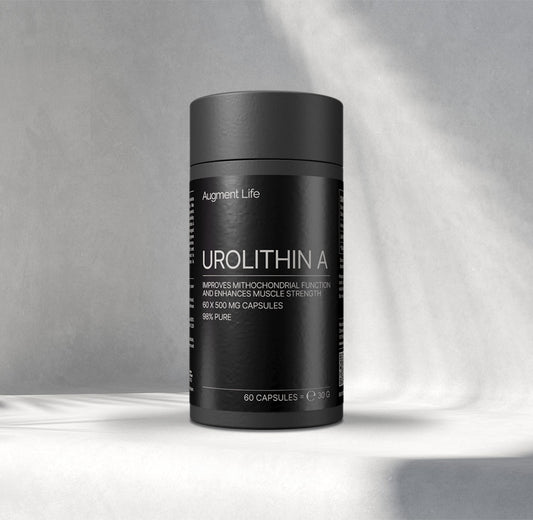Naarmate we ouder worden, neemt onze spiermassa af en lopen we meer risico op sarcopenie en andere spiergerelateerde ziekten. Daarnaast kan het moeilijker worden om eiwitten uit onze voeding op te nemen en te synthetiseren, of krijgen we simpelweg niet genoeg voedingsstoffen binnen. Wat is de voor de hand liggende oplossing? Meer eiwitten aan onze voeding toevoegen lijkt de logische keuze.
Toch laat sommige onderzoeken zien dat we mogelijk helemaal geen extra eiwitten nodig hebben. Het zou juist beter kunnen zijn om zo weinig mogelijk eiwitten te eten, of in ieder geval uitsluitend dierlijke eiwitten! Zelfs gerenommeerde gezondheid- en langlevensonderzoekers zoals Peter Attia, Michael Greger en Victor Longo lijken het niet eens te kunnen worden over een duidelijke conclusie.
Dus wat is de echte waarheid? Moeten we eiwitten eten naarmate we ouder worden of niet? Lees het artikel verder en ontdek het!
Wat zijn eiwitten en waarom hebben we ze nodig?
Voordat we ons verdiepen in hoe we moeten eten naarmate we ouder worden, beginnen we met de basis. Door de fundamentele biologie achter eiwitten en hun rol in ons lichaam te begrijpen, kunnen we beter beoordelen waarom we ze wel of niet nodig hebben.
Eiwitten, samen met vetten en koolhydraten, vormen de basisbouwstenen van ons voedsel. Maar dat is niet alles. Eiwitten zijn ook de bouwstenen van onze cellen, weefsels en organen (samen met vetten, suikers, mineralen, enzovoort). Ze spelen een cruciale rol in vrijwel elk biologisch en moleculair proces en worden vaak de bouwstenen van het leven genoemd.
Hier zijn enkele biologische functies van eiwitten (1):
- Essentieel voor spierfunctie en beweging,
- Bieden kracht en ondersteuning aan cellen en weefsels,
- Transporteren van moleculen door het hele lichaam,
- Handhaven van de vochtbalans in het lichaam,
- Communiceren tussen cellen en weefsels,
- Bloedstolling,
- Immuunafweer,
- Synthese van DNA en energiemoleculen,
- Sommige eiwitten functioneren als hormonen die als chemische boodschappers werken.
Wat zijn aminozuren?
Eiwitten zijn complexe en vaak grote organische moleculen die zijn opgebouwd uit ketens van aminozuren. De kleinste eiwitten kunnen slechts een paar aminozuren bevatten, terwijl de grootste eiwitten er miljoenen kunnen hebben. Er zijn 20 verschillende aminozuren, en hun volgorde bepaalt de structuur en functie van een eiwit. Hoe eiwitten worden gevormd en gerangschikt, is vastgelegd in ons DNA.
Ons lichaam kan sommige aminozuren zelf aanmaken (niet-essentiële aminozuren), maar andere moeten we uit voedsel halen (essentiële aminozuren) (2). Dit maakt duidelijk waarom het cruciaal is om voldoende eiwitten te eten. Zonder eiwitten is er geen leven mogelijk.
Aanbevolen dagelijkse eiwitinname
Voor een volwassene met een gemiddeld lichaamsgewicht en activiteitenniveau is de aanbevolen dagelijkse hoeveelheid eiwit 0,8 gram per kilogram lichaamsgewicht. Dit komt neer op ongeveer 10% van de calorieën in je dieet, of tot 60 gram eiwit per dag (natuurlijk afhankelijk van je gewicht) (3).
Deze behoefte verandert aanzienlijk als:
- Je een hoog activiteitenniveau hebt,
- Je een kind of tiener bent,
- Je zwanger bent of borstvoeding geeft,
- Je ouder bent dan 65 jaar.
Er is geen strikt aanbevolen maximum eiwitinname per dag, omdat dit afhankelijk is van verschillende factoren. Over het algemeen kan een maximum van ongeveer 2 gram eiwit per kilogram lichaamsgewicht per dag worden aangehouden, omdat een hogere inname belastend kan zijn voor de nieren.
Moeten we eiwitten eten naarmate we ouder worden?
Kort gezegd: ja. Diverse wetenschappelijke studies op mensen tonen aan dat we eiwitten nodig hebben naarmate we ouder worden. Maar de vraag blijft: hoeveel eiwitten hebben we nodig?
In praktische termen zou de aanbevolen hoeveelheid eiwitten voor iemand boven de 65 jaar 1,2 tot 1,5 gram eiwit per kilogram lichaamsgewicht moeten zijn (3, 4, 5). Deze hoeveelheid helpt spierverlies en de ontwikkeling van sarcopenie te voorkomen, wat veel voorkomt bij ouderen. Deze aanbevelingen worden ondersteund door artsen en wetenschappers zoals dr. Peter Attia en dr. Victor Longo.
Er zijn echter ook onderzoeken die suggereren dat het eten van meer dan de aanbevolen dagelijkse hoeveelheid eiwit voor volwassenen (0,8 gram per kg lichaamsgewicht) schadelijk kan zijn en geen extra gezondheidsvoordelen biedt. Dr. Michael Greger, een Amerikaanse arts en voedingsdeskundige, is een groot voorstander van het niet verhogen van de eiwitinname naarmate we ouder worden, om redenen zoals:
- Verhoogde sterfte en verhoogd risico op kanker,
- Grotere belasting van de nieren,
- Verhoogd risico op hart- en vaatziekten en diabetes bij het eten van meer dierlijke eiwitten.
Referenties:
- LaPelusa A, Kaushik R. Physiology, Proteins. [Updated 2022 Nov 14]. In: StatPearls [Internet]. Treasure Island (FL): StatPearls Publishing; 2024 Jan-. Available from: https://www.ncbi.nlm.nih.gov/books/NBK555990/
- Church DD, Hirsch KR, Park S, Kim IY, Gwin JA, Pasiakos SM, Wolfe RR, Ferrando AA. Essential Amino Acids and Protein Synthesis: Insights into Maximizing the Muscle and Whole-Body Response to Feeding. Nutrients. 2020 Dec 2;12(12):3717. doi: 10.3390/nu12123717.
- Deutz NE, Bauer JM, Barazzoni R, et al. Protein intake and exercise for optimal muscle function with aging: recommendations from the ESPEN Expert Group. Clin Nutr. 2014;33(6):929-936. https://doi.org/10.1016/j.clnu.2014.04.007
- Putra C, Konow N, Gage M, York CG, Mangano KM. Protein Source and Muscle Health in Older Adults: A Literature Review. Nutrients. 2021;13(3):743. Published 2021 Feb 26. https://doi.org/10.3390/nu13030743
- Rogeri PS, Zanella R Jr, Martins GL, Garcia MDA, Leite G, Lugaresi R, Gasparini SO, Sperandio GA, Ferreira LHB, Souza-Junior TP, Lancha AH Jr. Strategies to Prevent Sarcopenia in the Aging Process: Role of Protein Intake and Exercise. Nutrients. 2021 Dec 23;14(1):52. doi: 10.3390/nu14010052.
- Levine ME, Suarez JA, Brandhorst S, Balasubramanian P, Cheng CW, Madia F, Fontana L, Mirisola MG, Guevara-Aguirre J, Wan J, Passarino G, Kennedy BK, Wei M, Cohen P, Crimmins EM, Longo VD. Low protein intake is associated with a major reduction in IGF-1, cancer, and overall mortality in the 65 and younger but not older population. Cell Metab. 2014 Mar 4;19(3):407-17. doi: 10.1016/j.cmet.2014.02.006.
- Zarantonello D, Brunori G. The Role of Plant-Based Diets in Preventing and Mitigating Chronic Kidney Disease: More Light than Shadows. J Clin Med. 2023 Sep 22;12(19):6137. doi: 10.3390/jcm12196137.
- Budhathoki S, Sawada N, Iwasaki M, Yamaji T, Goto A, Kotemori A, Ishihara J, Takachi R, Charvat H, Mizoue T, Iso H, Tsugane S; Japan Public Health Center–based Prospective Study Group. Association of Animal and Plant Protein Intake With All-Cause and Cause-Specific Mortality in a Japanese Cohort. JAMA Intern Med. 2019 Nov 1;179(11):1509-1518. doi: 10.1001/jamainternmed.2019.2806. Erratum in: JAMA Intern Med. 2019 Oct 1;179(10):1448. doi: 10.1001/jamainternmed.2019.4883.
- Buettner D, Skemp S. Blue Zones: Lessons From the World's Longest Lived. Am J Lifestyle Med. 2016 Jul 7;10(5):318-321. doi: 10.1177/1559827616637066.
- Xiao X, Zou PR, Hu F, Zhu W, Wei ZJ. Updates on Plant-Based Protein Products as an Alternative to Animal Protein: Technology, Properties, and Their Health Benefits. Molecules. 2023 May 11;28(10):4016. doi: 10.3390/molecules28104016.












